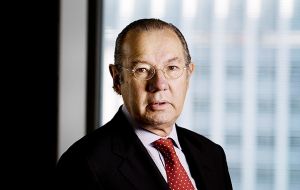MercoPress. South Atlantic News Agency
Capital flight from emerging economies will be on the G20 table, anticipate Brazilian sources
 Economist Rubens Barbosa, former Brazilian ambassador to Washington and London, says Brazil will try to defend multilateralism as upheld by the WTO
Economist Rubens Barbosa, former Brazilian ambassador to Washington and London, says Brazil will try to defend multilateralism as upheld by the WTO At this weekend's G20 meeting in Buenos Aires, finance ministers and central bankers will address the economic situations threatening a number of emerging markets -- including host nation Argentina, which recently secured a US$50 billion IMF loan to try to stabilize its economy, after the peso plunged 35% between April and June.
“The situation facing certain emerging markets is more delicate with the rise of the dollar and the question of capital flows,” a G20 source stated.
As well as the dollar, rising oil prices and US interest rates has helped fuel the capital flight from emerging economies such as Brazil and Argentina, with investors taking out US$14 billion between May and June.
Economist Rubens Barbosa, former Brazilian ambassador to Washington and London, says Brazil will try to defend multilateralism in international trade - notably as upheld by the World Trade Organization.
“In Buenos Aires, what will be on the table is protectionism and the strengthening of the WTO from the point of view of emerging countries such as Brazil,” he said.
Amidst such tensions, ministers will discuss the upsurge in debt amongst the poorest countries in the world, but not everyone believes there is a genuine resolve to do what's best for others.
“If you analyze attentively the final communiqués of these groups, historically they only showed what was agreed upon,” Nicolas Albertoni, a Uruguayan researcher at the University of Southern California said.
“Now, they also highlight what wasn't agreed upon, which demonstrates a rise in nationalism. Now, governments don't consider reaching agreement a success, but rather preventing it.”




Top Comments
Disclaimer & comment rules-

Read all comments“...the dollar, rising oil prices and US interest rates has helped fuel the capital flight from emerging economies such as Brazil and Argentina, with investors taking out US$14 billion between May and June.”
Jul 21st, 2018 - 03:09 pm -1These are some of the perks of the much-touted “return to the world” of Argentine president Mauricio Macri. The current situation was totally self-inflicted.
This return to the world was done at the expense of the citizens, to the benefit of large banks and financial institutions, a few large corporations and members of the Macri cabinet, most of whom have part of their money secured in offshore accounts.
So when the inevitable crisis explodes and many end up in the streets picking up cardboard to survive, characters such as Macri, Dujovne, Aranguren and others of the same ilk will end up much richer than they started.
These are the people IMF's Christine Lagarde says are taking the country in the good direction.
Commenting for this story is now closed.
If you have a Facebook account, become a fan and comment on our Facebook Page!